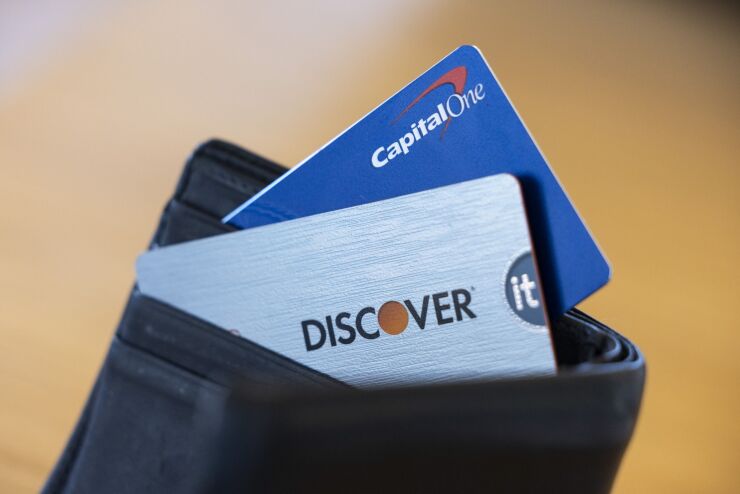
"Thank you for choosing American Airlines!"
Having flown between Miami and Philadelphia over 1,000 times since 1970, I hate that canned announcement, as I actually have no choice. Since their merger with U.S. Airways, which I
Like any good monopolist, they raised prices and reduced flights and service on this route, making sure every flight is at capacity or overbooked ("We are looking for volunteers!"). Their "first class" is really "big seat class," as only some foreign carriers offer real first class.
The proposed Capital One-Discover
My analysis, however, concludes that this merger can be approved with two conditions: a pro-competitive 1% interchange fee to increase competition by challenging the dominating Visa, and a pro-community 5% deposit reinvestment requirement to eliminate "
Antitrust economics can be complicated, so I prefer my simple "rule of three:" As long as there are at least three effective competitors in a given market for a given product, the public's conveniences and needs are likely being met.
The CEOs of two duopolists can get together on the golf course, but it's much harder for three players to collude, never knowing who can be trusted.
Merger decisions should focus on the relative market structure of the top three participants to identify and prevent a dominant No. 1 player.
There will always be a No. 1 firm for a given product in any market, but good public policy attempts to prevent or at least limit their market domination.
Competition is more about the quality rather than just the quantity of competitors. Even with several competitors, if No. 1 dominates all others, then it effectively acts as a monopoly. In fact, market dominators love weakling competitors and irrelevant internet participants because they give the appearance of many competitors but have no real competitive impact.
In my opinion, competition can best be preserved by examining the market power of No. 1 relative to Nos. 2 and 3, using the "market domination index," or
The primary MDI, or PMDI, is the ratio of market share of No. 1 to No. 2, and the secondary MDI (SMDI) is the ratio of No. 1's market share to the combined market share of Nos. 2 and 3. The focus must be on the relevant product in the relevant market.
My initial application of this MDI concept to bank mergers concluded that markets likely perform best with a maximum 1.5 PMDI and 1.0 SMDI. That is, No. 1 dominates with a market share more than 50% greater than No. 2 or more than double that of Nos. 2 and 3 combined. Lower MDIs mean less dominance by No. 1 and more competition.
The Capital One-Discover merger requires the analysis of numerous markets and products. For example, looking at national
Without overlapping retail offices, there is no local anti-competitive concern, although they both have "wholesale" credit card offices in Delaware with a combined $325 billion of nationwide
The merger would result in the
Banking regulators and the Department of Justice must decide whether the blockbuster deal raises antitrust concerns. Looming over their analyses are questions about how broadly or narrowly to define the relevant markets.
This merger's real pro-competitive impact would be reducing Visa's overwhelming dominance of the card network. Visa controls a stunning 61% of
Counting MasterCard, Visa is technically a "duopolist," but it is really a quasi-monopolist. The recent Department of Justice
It is not surprising that Visa and Mastercard, two of the world's
Discover's purchase by the larger, aggressive and hi-tech Capital One will increase share, especially as the only bank owning a global merchant network with direct connections to them.
But, there is no motivation for Capital One to challenge the duopoly on price.
This is where smart public policy can make a difference.
If a bank merger raises antitrust concerns in specific markets, DOJ may approve it after requiring branch, deposit or other business divestitures. DOJ, however, rarely imposes pricing conditions, which should be determined in a competitive marketplace.
A pro-competitive pricing condition, however, may be necessary when quasi-monopolists like Visa have permanently distorted competition.
DOJ should therefore require the merged Capital One-Discover to charge an average 1% interchange fee to help break the duopoly's 2% fee until network fees are in the 1% range and the PMDI and SMDI are at acceptable levels. Even at 1%, fees would still be higher than the duopolists' 0.3-0.4% fees in
Despite likely challenges of this pro-competitive fee condition from Visa, Mastercard and Capital One, this may be the only opportunity to rein in Visa's domination and have network competition.
Instead of hoping for a
Additionally, any Federal Reserve approval should require an anti-weblining "convenience and needs" condition regarding their $325 billion combined wholesale deposits, excluding deposits in Capital One's retail offices.
The
The Fed should use the
The next time you hear "What's in your wallet?" the answer should be "much less costly and more community impactful credit cards," if this merger is approved with the 1% pro-competitive pricing and 5% anti-weblining conditions.






